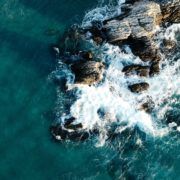Plastic Soup Foundation organizes a pellet count in the Netherlands
Amsterdam, 28 January 2019 – At the start of this month freighter MSC Zoe lost at least 292 containers, some of which were filled with pellets. Pellets, also called nurdles and no more than 5 millimeters big, are used to make plastic products. The beach of Schiermonnikoog was covered with millions of these plastic granules. Because they can have a huge ecological impact on the fragile nature of the mudflats, the University of Groningen is investigating where they ended up. Contrary to larger pieces of plastic, these pellets can barely be cleaned up.
Unfortunately, the loss of the millions of pellets on the Wadden Sea wasn’t an exception. In October 2017 nurdles from two cargo ships entered the ocean near the South African harbor town of Durban, after which a massive amount washed ashore. Furthermore, a recent Danish report shows that an extraordinary number of pellets were found in the environment around Danish plastic factories – the royal warrant holders of Lego. In May 2018 around 450.000 pellets were found on just one beach in Scotland; twelve miles from the Ineos Polymers factory where they are produced. And in 2016 English consultant Eunomia calculated that up to 53 billion plastic pellets are lost and end up in the environment in the United Kingdom alone.
It is not surprising that pellet loss is considered to be one of the major causes of the plastic soup. Yet there is no national or international organization monitoring it. Because this has actually been a known problem for a long time, plastic manufacturers have voluntarily united in Operation Clean Sweep (OCS). By its own account, this industrial initiative applies the best possible practices to prevent pellets from ending up in the ocean. But basically, the industry has free rein and is never fined or confronted. The past 25 years the OCS has also never had to publicly show their accountability. MacKerron, vice president of the American NGO As You Sow: “Operation Clean Sweep provides no transparency on the scope and nature of spills or efforts made to clean up. Given what we know about the alarming rates of plastic leakage into oceans, companies can no longer hide behind vague pledges of best practices. They need to provide prompt and detailed disclosure about specific actions taken to prevent spills, and when spills occur, information on spill size, and actions taken to clean up.”
As You Sow has called to account the American pellet manufacturers Chevron, DowDupont, ExxonMobil and Philips 66 during shareholders’ meetings, and have demanded the creation of at least yearly reports that map the spills, describe which measures have been taken and how the spills were cleaned up.
It is extremely important to gather evidence, so we can enforce measures that lead to the industry taking care of transport without pellet loss. Where and in what concentrations are the pellets found on coastlines and shores? Everyone can simply help build this data with a smartphone, whether alone or in a group. The Great Global Nurdle Hunt takes place between Friday 8 and Sunday 17 February.
With that in mind The Plastic Soup Foundation will organize various pellet counts in the Netherlands that week, at new and still secret hot spot locations in places such as Zeeland and Limburg. Join us and sign up by e-mailing michielp@plasticsoupfoundation.org. You will then receive more information on dates, times and locations.










